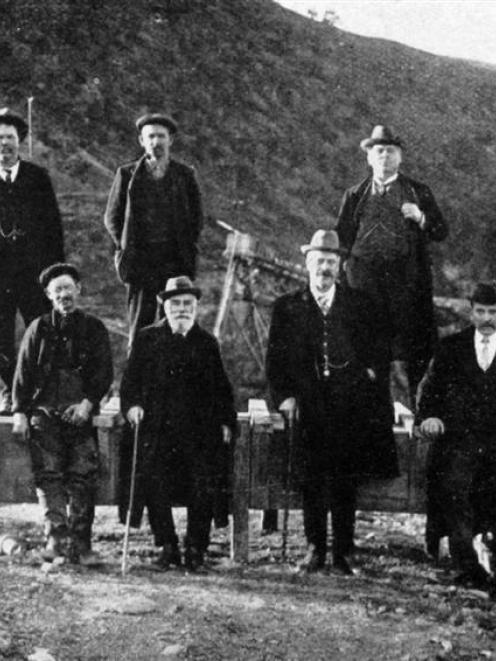
The arrangements made in connection with the disembarkation of the men and their conveyance to the hall were a credit to those responsible for them, and were adhered to and carried out in splendid style, not a hitch occurring anywhere.
The motor car owners turned up at the rendezvous sharp to time, and long before they were required four lines of cars stretched from the end of the shed to right round the corner, about 150 in all, including several trade lorries and delivery vans.
At 9 o'clock all were loaded up, and after half an hour's wait to get everything properly settled for the procession a start was made for the hall.
While the men and their relatives were boarding the cars and during the intervening time the band of the 4th Regiment, under Lieutenant George, played a number of patriotic airs; afterwards it entered a lorry and proceeded towards town, taking up its position at the head of the procession.
A little cheering was to be heard as the men boarded the cars, a number of people having seized upon points of vantage in the vicinity, but it was not till the procession got under way that the voice of the general public began to be heard.
The Otago High School Cadets, under Captain Robertson, were lined up on both sides of the route at the commencement, but thereafter the public had a free hand, and made good use of it.
It was one of the finest turnouts that Dunedin has to its credit, the crowd not only being a very great one, but,contrary to the usual practice of crowds, spreading itself out along the whole of the distance, thereby not only giving everyone a chance to see the men, but giving the procession itself a finer track and the men a much heartier welcome.
Shortly after 9 o'clock there were some thousands of people in the commodious drill hall at Kensington.
The interior had been handsomely decorated by Mr J. M'Laughlin with innumerable flags, those of the Allies running down the centre of the ceiling.
A large platform was adorned with greenery, backed with flags, and supported a dais, on which seats were placed for the Mayor, the Ministers of the Crown, and others.
Before the soldiers arrived an orchestra, conducted by Mr Stokes, played very acceptable music, and the band of the 4th Regiment, under Lieutenant George, contributed martial airs.
The music was very welcome to the waiting crowd.
At a quarter to 10 the motor cars with the returned soldiers began to arrive, and as the men entered the hall they were received with enthusiastic applause and cheers.
• In regard to the war census, the Hon. G. W. Russell, speaking at a meeting of the Dunedin Orphans' Club said after the registration had been completed and the names and details thoroughly examined, he intended to send a personal letter to every man whom he considered capable of serving, urging upon him his duty to the Empire.
After the compulsory registration had been got going he intended to open a voluntary registration for women with the object of ascertaining what women in New Zealand were prepared, should necessity arise, to fill the places of men who had gone to the front.
Thus, when women were found able and willing to do this there would be no excuse on that score for certain men.
He would say to these men: ''Here's a woman who can take on your job. Now, off you go to the front.''
• On Saturday the river steamer Clyde was successfully lifted at Tuapeka Mouth.
The method was similar to that which recently proved successful with the Clutha.
This week the Clyde will be given a cleaning-out, and all going well it is expected that she will be brought down to Balclutha by the end of the week.
• Though Trentham camp has been occupied for over a year as a military training ground, and has had an adult male population averaging considerably above that of many towns in New Zealand, it has not produced a newspaper until the Camp Courier made its appearance at the end of last week.
The new sheet is described as ''a purely camp issue, devoted to the interest of the military township''. - ODT, 28.10.1915.
• COPIES OF PICTURE AVAILABLE FROM ODT FRONT OFFICE, LOWER STUART ST, OR WWW.OTAGOIMAGES.CO.NZ












